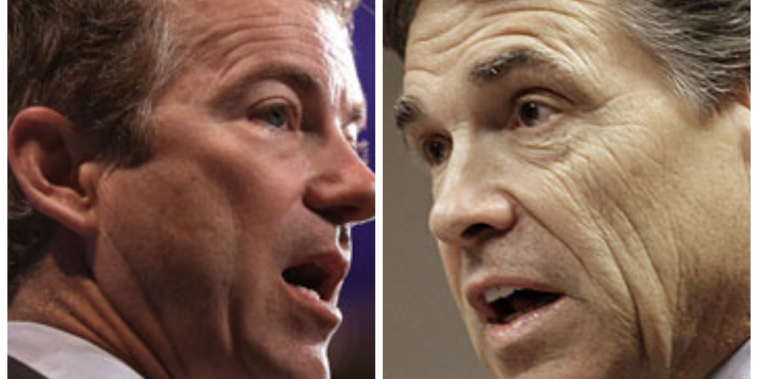On Wednesday, Michael Brendan Dougherty said at The Week,“Rand Paul and Rick Perry are having the most important debate of the 2016 election.”
Videos By Rare
Dougherty’s point was that while economics drives most voters, presidents have very little control over the economy though they do have great influence in how the U.S. conducts it’s foreign affairs.
But it’s also worth noting that considering the staggering cost, our foreign policy plays a significant economic role in America’s long-term financial stability. What kind of foreign policy presidents’ desire comes with a price tag.
How much Republicans are willing to pay cuts to the heart of what it means to be a conservative. Reagan famously said “Government is not the solution to our problem; government is the problem.”
If American conservatism was a bumper sticker, this would be it.
But Reagan also expanded government and ran up the debt, largely through a massive defense buildup, something conservatives forgave due to the unique existential threat the Soviet Union posed to the United States.
In 1952, long before Reagan became president, William F. Buckley said that conservatives must endure big government until the Cold War was won. Buckley understood that a military large enough to defeat the Soviets would necessarily require a substantial state.
In many ways the modern conservative movement is a product of both constitutional or limited government ethos, and anti-communism, however contradictory both philosophies might have been in practice.
The Soviet Union is now dead. Big government is not. Our current national debt stands at about $17 trillion. On Wednesday, the Congressional Budget Office announced that its total deficit projection for the next decade is $7.6 trillion.
A decade of wars in Iraq and Afghanistan cost between $4-6 trillion. To contrast with another big ticket government item, Obamacare—which virtually every Republicans agrees we can’t afford—will cost about $2 trillion in the first decade.
The spat between Paul and Perry isn’t so much about policy differences—Perry doesn’t really offer any—but about what each side is willing to accept in terms of significantly rethinking American foreign policy.
Paul’s message for sometime has been that we should do less around the world, while meeting current threats in a more practical and cost effective way.
Perry’s contextual message is that the Iraq and Afghanistan wars were essential, including the cost (though most Americans disagree, including veterans), and that we should not be hesitant to fight similar wars again.
Perry is not alone. Possible 2016 GOP presidential contender Jeb Bush also thinks this. So does rumored 2016 candidate Rick Santorum. 2008 Republican nominee John McCain certainly thinks this. According to neoconservative pundit Jennifer Rubin, all Republicans think this with the exception of Rand Paul.
The only legislative victory the cost-conscious tea party ever had was the 2011 budget deal that included the sequester. It was the only guarantee that we would actually reduce the deficit seen in, well, forever…
And alleged fiscal conservative Paul Ryan led the charge to kill the sequester.
Why? Because it would “gut” the military, despite the fact that the Pentagon budget is larger today than ever.
Still, Ryan wants to spend more.
If today’s foreign threats are on par with what the Soviet Union represented, as many Republicans apparently believe they are, are conservatives also essentially conceding that big government is here to stay?
Buckley thought conservatives should endure big government for a certain time. Thankfully, the Cold War ended.
Today, we are told by many conservatives that the war on terror will never end. Are they also saying we must endure big government forever?
Disclosure: I co-authored Senator Rand Paul’s 2011 book The Tea Party Goes to Washington.

